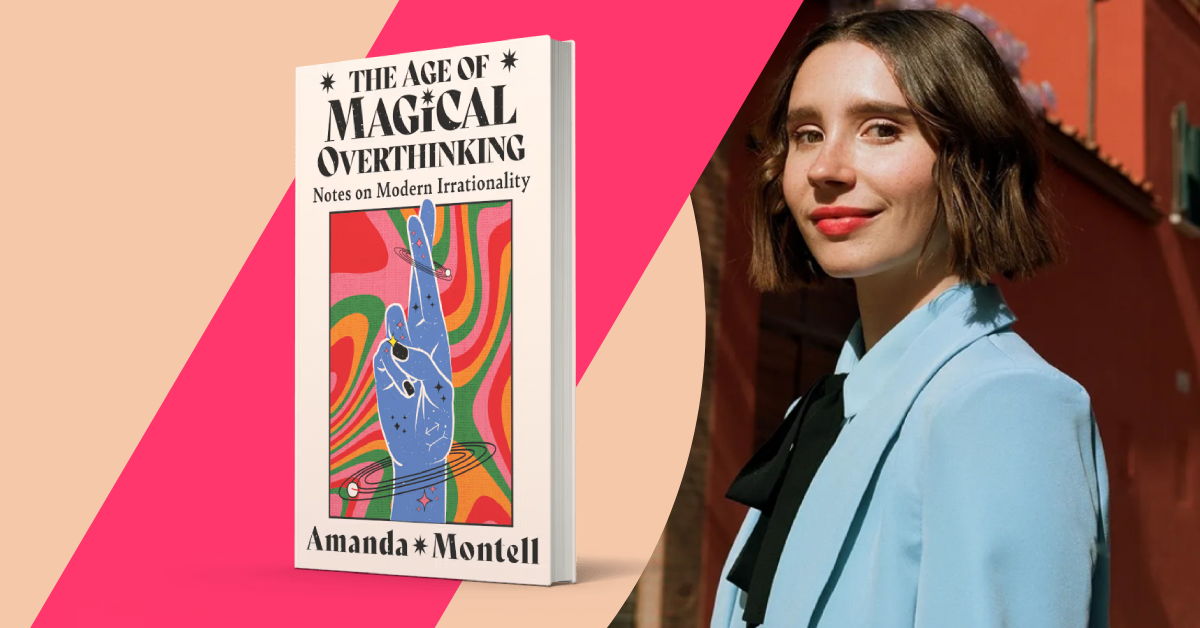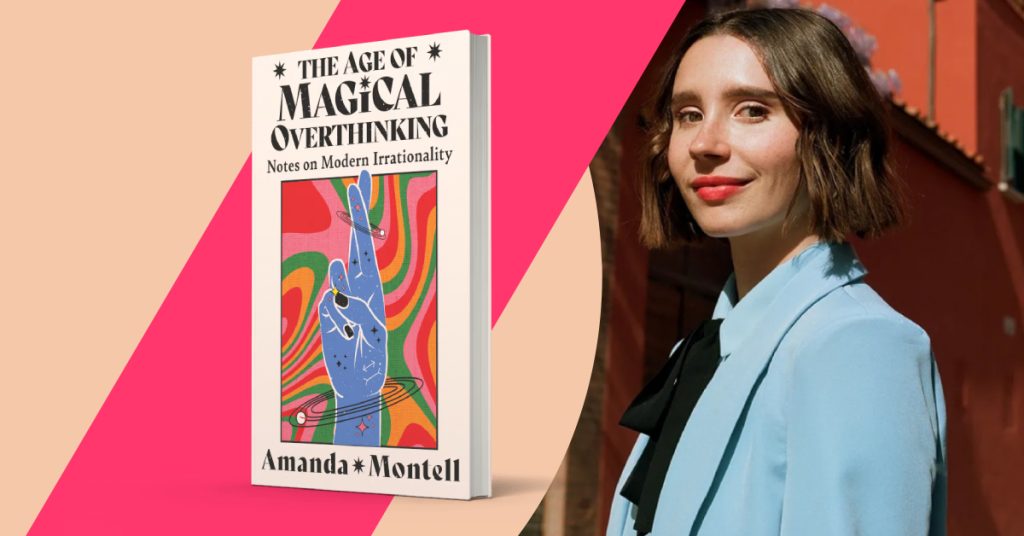We may earn money or products from the companies mentioned in this post.
Modern Society Is Rewiring Your Brain
Modern brainwashing? Maybe…
Mass cognitive dysfunction, most definitely!
Whether manipulated by the puppet strings pulled by higher forces or not, one thing is undeniable:
modern society is altering the very fabric of our minds, reshaping our thought patterns in ways we cannot ignore.
How Does Modern Society Affect The Way You Think
Ever wondered why we all have a tendency to overthink and entertain whimsical ideas?
While there are most definitely several factors at play, Amanda Montell’s latest book ‘The Age of Magical Overthinking: Notes on Modern Irrationality’ uncovers how 21st century advancements have disturbingly influenced our cognitive processes.
The best-selling author, Amanda Montell, hones in on a selection of “cognitive bias” and how they link to our day-to-day lives and affect the way we view the world.
She frequently elicits self-reflective insights and gently nudges you to reconsider the way you think; encouraging you to take on an entirely different perspective on the world.
What is 'cognitive bias' in psychology?
“Cognitive biases are predictable patterns of error in how the human brain functions”.
Britannica
A cognitive bias is often scientifically proven through large scale studies and years of testing and examinations.
Cognitive biases are flaws to instances where you would expect humans to think rationally.
It is a deeper understanding of our nature to think irrationally and provides a broader interpretation and explanation to why we behave in this way.
“Because cognitive biases affect how people understand and even perceive reality, they are difficult for individuals to avoid and in fact can lead different individuals to subjectively different interpretations of objective facts”.
Britannica
The Illusory Truth Effect
One of the biases, recognized by Montell as “The Illusory Truth Effect”, is the notion that we accept something as real only because we have heard it conveyed multiple times.
In an interview with Dan Skinner of ‘Some Books Considered’, she openly acknowledges that there are instances, such as this, where “Even awareness will not help you”.
The term ‘cognitive bias’ summarizes a cause and effect for our irrational ways of thinking.
How Social Media Is Affecting Your Mental Health
Many allusions to social media and its impact on our cognitive processes are found throughout the book. Given how integral social media is to daily living, this only seems logical.
In an interview with Brit + Co, Montell explains that “despite us living in the so-called information age”, there seems to be an “inexplicable excess of ‘delulu’ in the culture”.
She continues by giving examples of “people with masters degrees basing their genuine decisions on astrology” and her “neighbours opting not to get the COVID vaccine because a Tik Toker… told them it would downgrade their DNA”.
Without doing any further reading, most people would probably agree that there is an element of truth to this. We have this urge to be sucked into the deep dark rabbit holes of the internet and believe everything we consume.
Amanda Montell has written this incredible collection of short, immersive revelations to enlighten us and highlight the irrational reasons behind our tendency to overthink incessantly. She accomplishes this in such a creative way by addressing cognitive biases that we can all relate to.
Examples Of How Modern Society Is Shaping Humans
Each chapter explores a new ‘cognitive bias’ and gives examples of how modern societal pressures change how we think and act.
Below are some of the cognitive biases discussed in the book.
Sunk Cost Fallacy
On the ‘What Fresh Hell Podcast’, Montell defines the Sunk Cost Fallacy as the temptation to persevere with a terrible decision because you’ve already significantly invested a great deal into it.
Amanda Montell talks about her experience in a “cult-like romantic relationship”, where she defended her decision to stick with it even though it wasn’t working out. She refused to accept that the relationship would never return to its original condition, believing herself that success was “just around the corner” and that she couldn’t give up after so much effort and dedication.
Montell also touches on how long-term cult followers, for instance those who have spent 20 years in Scientology, may be impacted by such biases. Despite unmet promises, they are too devoted to admitting their mistakes since they have invested an enormous amount of their life into the belief system.
Acknowledging this cognitive bias enables you to comprehend how cultural influences may cause you to continue making bad decisions because you feel guilty about owning up to your mistakes.
Additive vs Subtractive Solution Bias
Amanda Montell describes the additive bias, noting that “we as human beings… especially growing up in a consumerist society, aim to solve problems by adding variables to the situation”.
She explains that when something is going wrong:
"We think… we need to buy something or hire someone or add something to the issue in order to solve the problem. Oftentimes, the much more effective but less intuitive solution is to take something away".
Amanda Montell
Montell references a study in which subjects were given a puzzle composed of coloured blocks. The participants have the option of adding or removing blocks to solve it. Although taking the blocks out was a simpler method, the majority of participants decided to add them.
This study demonstrates just how deeply embedded the additive cognitive bias is in our behaviour. It enables people to choose more difficult , yet less obvious, solutions.
The Halo Effect and Its Modern Implications
According to the concept known as the ‘Halo Effect’, “we admire one single trait in a person and jump to the conclusion that they must be perfect overall”.
This prejudicial thinking stems from the early stages of human development, when in ancient times, we looked to society for role models.
Amanda Montell clarifies that “we are now mapping those jumps to conclusions onto our modern para-social relationships”, and this is “proving destructive for both the subject of our worship and [the admirer] themselves”.
Montell draws a comparison between how we used to see our parents and how we now admire superstars on social media. As we get older, we become more aware of our parents’ faults. An idealised, “100% perfect” role model can have detrimental effects on their followers, and she says that we should embrace people’s imperfections since they qualify a person.
Celebrities are portrayed by the media as perfect superhumans, yet they are just like the rest of us. Although it’s normal to look up to someone for their admirable qualities, Montell contends that we should be more understanding of these people and understand that they are not inherently different from us.
The Age of Magical Overthinking Summary
The Age of Magical Overthinking: Notes on Modern Irrationality by Amanda Montell offers a comprehensive and important analysis of how contemporary civilization is rewiring our brains, frequently in ways that result in illogical thinking.
Despite our best attempts to remain knowledgeable and logical, Montell contends that awareness is inadequate to overcome the deeply rooted prejudices that influence our judgements and perceptions. Her observations on cognitive biases, like the Halo Effect, the Illusory Truth Effect, and the Sunk Cost Fallacy, highlight how much outside influences shape our mental processes and frequently lead us wrong.
For example, Montell’s analysis of the Sunk Cost Fallacy shows how people frequently stick with bad choices because we have already committed a significant amount of time and money to them.
As Montell demonstrates with her own experience in a disastrous love relationship, this bias affects people in their personal lives as well as more general society behaviours like long-term attachments to unfulfilling or damaging organisations.
Recognising this bias is the first step in breaking away from these patterns. It enables us to realise how personal investments and social pressures may trap us in cycles of bad decision-making.
Similar to this, the Illusory Truth Effect shows how lies may appear genuine via repetition. This bias is especially pertinent in the information-rich world of today, as social media platforms constantly feed us messages that influence our opinions and choices, often without our conscious knowledge.
The fact that Montell admitted that “even awareness will not help you” in some situations highlights the strength of this prejudice and how difficult it is to overcome. This means that we should interact more critically with the information we take in, asking questions and doing our own research instead of taking things that are said repeatedly at face value.
The Halo Effect causes us to overgeneralize from a single favourable attribute to an overall positive assessment of a person, thus complicating our cognitive landscape. Montell illustrates how this antiquated prejudice has changed in the digital era by drawing a connection between it and how we used to see our parents as children and how we now idolise celebrities on social media.
We may establish unattainable expectations and ignore defects, which may be harmful to both ourselves and the people we look up to. Relationships and expectations might become better and more grounded when one accepts the flaws of celebrities and role models.
How Amanda Montell’s Work Helps Us Moving Forward
In a world where cultural pressures and technology amplify cognitive biases, Montell’s work serves as a call to action.
Her thorough examination of these biases teaches us about the ways in which our reasoning is distorted and motivates us to take proactive measures to think more logically and impartially. We may start to lessen the influence of our cognitive biases on our lives by being aware of them and learning how to deal with them.
In conclusion, while awareness of cognitive biases is a crucial first step, it is not enough on its own. Montell’s insights compel us to actively work on identifying and challenging these biases in our daily lives.
Only through conscious effort and critical thinking can we hope to navigate the complexities of modern society with greater rationality and clarity. Montell’s The Age of Magical Overthinking thus serves as both a warning and a guide, helping us understand the mental traps we face and offering tools to overcome them in our pursuit of a more rational and fulfilling life.






No Comment! Be the first one.